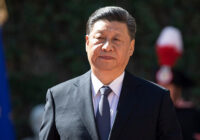The international community must accelerate efforts to bring the conflict parties back to the negotiating table in Yemen.
For over three months, a Saudi-led military alliance has been bombing Yemen in an attempt to weaken the Houthis, a predominantly Zaidi Shiite group, and their ally, former Yemeni President Ali Abdullah Saleh.
After the Houthis completed a coup d’état in the capital Sana’a earlier this year, and after Yemeni President Abdo Rabbo Mansour Hadi and parts of his government fled to Riyadh, the Saudis began a military campaign in order to prevent the fall of the southern port city of Aden, to make the Houthis retreat and to pave the way for Hadi’s comeback.
Until now, the military operation has proved extremely short-sighted and largely failed to deliver. Despite the massive airstrikes, the Houthis have managed to hold their territorial control and extend the conflict to the Saudi-Yemeni border region. The only tangible result is large-scale destruction of Yemeni infrastructure, as well as a society being ripped apart by a multi-layered conflict.
Short-sightedness and miscalculation are terms equally applicable to the initiative of the Gulf Cooperation Council (GCC), which in 2011 put an end to a months-long elite battle between then-President Saleh and his rivals. Many international observers described the GCC deal back then as an effective mechanism that succeeded in preventing a prolonged civil war, as well as a suitable model for other countries in transition—notably Syria.
Momentarily, the GCC initiative stopped large-scale violence and set a transition process in motion, with the National Dialogue Conference (NDC) at its heart.
However, nearly four years after Saleh stepped down and handed over power to Hadi, his long-time vice president, it appears that Yemen has finally fallen down the brink and into the abyss of a protracted civil and regional proxy war. The GCC initiative can no longer be heralded as a model for other countries in transition, but merely as a better ceasefire that allowed the different groups to regain strength or to make their entry into Yemeni power politics.
The NDC aimed at renegotiating the social contract between the Yemeni people and the state. However, from the outset, this process was undermined by the continuation of the elite power struggle that started to emerge in the 2000s, and it eventually led to the violent elite conflict in 2011.
The continuation of this elite infighting was facilitated by—among other factors—granting Saleh immunity and allowing him to stay in Yemen. The GCC deal did not take out the central pillar around which Yemen’s political economy was constructed for over 30 years. Instead, it gave Saleh ample opportunity to plot for his revenge and comeback.
Formed after the handover of the presidency, the national unity government also facilitated the continuation of political infighting. The 50-50 distribution of government posts between the former ruling party, the General People’s Congress (GPC), and the former opposition coalition, the Joint Meeting of Parties (JMP), meant that most of the time government members were busy with blocking the implementation of each other’s decisions, thereby contributing to the massive standstill over introducing vital reforms.
Although having helped to set in motion Yemen’s transition, the GCC did little to consolidate the process through economic aid and investment. Instead, in 2013, Saudi Arabia took the decision to revise its visa requirements. This resulted in large numbers of Yemeni workers having to leave the country and return to impoverished Yemen because they could not meet the new regulations, putting further pressure on the country’s strained labor market.
Choosing Hadi as a successor to political fox Saleh proved to be a bet on a dead horse, given the former’s lack of power and legitimacy. As he struggled to eliminate Saleh’s influence in the armed forces, Hadi resorted to similar cooptation strategies as his predecessor but miscalculated the strength of groups such as the Houthis who, along with the secessionist Southern Movement (al-Hirak), were excluded from the negotiation process preceding the GCC initiative.
The Way Forward
Four years after the ink has dried on the paper of the GCC initiative, the deal’s short-sightedness has backfired on its initiators—the forefront of which is Saudi Arabia. The GCC deal mainly served short-term stability and security interests of Yemen’s neighbors by keeping most of the country’s elite powerbrokers largely untouched and in place. Meanwhile, during the four year “ceasefire,” frustration over the disastrous socioeconomic situation reached new heights and was exploited by groups such as the Houthis, in order to build and consolidate their popular support base and strike a powerful alliance with Saleh.
Equally, the last four years bore witness to the strengthening of the Sunni-Shiite narrative through the evolving dynamics of both the Syrian and Iraqi conflicts.
With the Saudi-led military intervention against the Shiite Houthis and the regionalization of the Yemeni conflict, this narrative is now being forced onto the Yemeni context and threatens to become a self-fulfilling prophecy.
In order to avoid such a scenario from taking deeper roots and to prevent the impending destruction of Yemeni society, the international community should accelerate efforts to bring the conflict parties back to the negotiating table. For this, the parties to the conflict must be pressured to halt all violence. What is then needed is a comprehensive peace and transition process not only serving the stability and security interests of Yemen’s neighbors, but also aiming at a substantial renegotiation of the social contract to be supported by a concrete socioeconomic reform plan.
The views expressed in this article are the author’s own and do not necessarily reflect Fair Observer’s editorial policy.
Photo Credit: Vladimir Melnik / Shutterstock.com
 We bring you perspectives from around the world. Help us to inform and educate. Your donation is tax-deductible. Join over 400 people to become a donor or you could choose to be a sponsor.
We bring you perspectives from around the world. Help us to inform and educate. Your donation is tax-deductible. Join over 400 people to become a donor or you could choose to be a sponsor.
Support Fair Observer
We rely on your support for our independence, diversity and quality.
For more than 10 years, Fair Observer has been free, fair and independent. No billionaire owns us, no advertisers control us. We are a reader-supported nonprofit. Unlike many other publications, we keep our content free for readers regardless of where they live or whether they can afford to pay. We have no paywalls and no ads.
In the post-truth era of fake news, echo chambers and filter bubbles, we publish a plurality of perspectives from around the world. Anyone can publish with us, but everyone goes through a rigorous editorial process. So, you get fact-checked, well-reasoned content instead of noise.
We publish 2,500+ voices from 90+ countries. We also conduct education and training programs
on subjects ranging from digital media and journalism to writing and critical thinking. This
doesn’t come cheap. Servers, editors, trainers and web developers cost
money.
Please consider supporting us on a regular basis as a recurring donor or a
sustaining member.
Will you support FO’s journalism?
We rely on your support for our independence, diversity and quality.







Comment